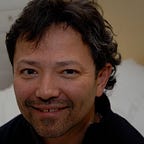Deleuze, Jung and the Impressionists, Part 1 of 4
Creative Experience and Intuition
Thought that is dominated by a view that it is superior to life, negates life, conforms life to rules mystically imposed from beyond the field.
Thought based in rules from beyond produces conformity and an unfulfilling life, a life dominated by slavery to transcendent ideas.
We need a fresh approach to our own thinking, one that frees us to experience the world again, new and overflowing with creativity and diversity.
If we ever wish to be truly free, we need to abandon a dogmatic image of thought based in transcendence.
Radical Empiricism
Empiricism for Gilles Deleuze does not concern thought in the conventional sense of knowledge. His empiricism is thought that has its genesis in experience. Experience creates thought about the universe; reality is constructed in the field.
And the genetic principle for thought is the affirmation of difference. Reality is based in experience that has its genesis in difference.
There is no external application of categories, as per Kant, mediated by a transcendent subject equipped with reason, no duality of sensible and intelligible. The sensible is created from virtual differentials in intensity and the intelligible is spawned within the same field.
Pure unmediated experience knows no thought confined by transcendent imperatives.
We can only experience the empirical by bringing all of our faculties to bear in one continuous immanent process:
perception — affection — intuition — cognition
Reality and Our Experience of Reality
Reality and our experience of reality are only separate questions when divided by a transcendent subject that stands over and apart from reality, completing it.
A subject created in the pure difference of reality constructs reality in thought that knows no split between reality and thought.
Reality and our experience of reality is one in terms of difference. Thought based in pure difference breaks down the walls between the subjective and objective: there is only one field of which we are constituted; and in which we participate, encounter intensities, and generate thought based in difference.
Radical empiricism is thought and understanding beyond reason and rationality. It is rejection of the authority of transcendent reason, rejection of the subjective whole of identity. It is paradox, confronting reality via sensibility, encountering the being of the sensible, the becoming of reality.
Radical empiricism is sensing temporally, sparking intuition and creating a language; procreating maps, to bring us in contact with pure becoming.
The Psychological Types
Sensing, feeling and intuiting are the originators and drivers of thinking. They place us in the field, and generate thought.
We might do well to recall Carl Jung’s theory of Psychological Types: the four faculties of sensing, feeling, intuiting and thinking.
Sensing and intuiting are immediate, passive and involve no evaluation of phenomena; they are pure encounters with reality. Feeling, post affectation, and thinking are active and involve a mediation or evaluation of phenomena.
It is the passive unmediated encounters with reality that Deleuze posits as the genesis of thought. Intuition, in particular, as an unmediated driver of thought, is the faculty that enables us to, as per Todd May, palpate difference-in-itself.
Intuition enables us to connect radically with the empirical, to sense beyond the sensation of things, to come directly in contact with the being of sensation, ie., the temporal and virtual.
In this regard, it is clear Deleuze was influenced by Jung’s view of the psyche as process over structure:
Was not one of the most important points of Jung’s theory already to be found here: the force of “questioning” in the unconscious, the conception of the unconscious as an unconscious of “problems” and “tasks”? Drawing out the consequences of this led Jung to the discovery of a process of differentiation more profound than the resulting opposition (see The Ego and the Unconscious). (Difference and Repetition)
Henri Bergson’s Intuition
Both Deleuze and Jung were in turn deeply influenced by the French philosopher, Henri Bergson, and his concept of intuition.
For Bergson, intuition is a philosophical method that enables us to avoid analytical abstraction and step directly into the flow of reality. Intuition is deliberate, reflective awareness that enables us to bypass the tendency to mediate reality via space-time causality, and directly experience reality as a flow of pure change.
Jung and Deleuze both pick up on Bergson’s method of intuition; for the former an altered perception of intensity; for the latter a means of experiencing difference-in-itself. All three viewed intuition as a means of connecting with the forces of nature and vitality.
Intuition is the genesis of creative thought when forced to encounter the unthinkable, the inexpressible, where words turn back.
Behind the mask there is nothing. Behind pure difference there is nothing, but we can experience that pure force of creativity, in which something is created from nothing by accessing our faculty of intuition and grasping the purely temporal nature of creativity.
Faced with an encounter with the problematic, via intuition, we can enter the temporal flow of reality, beyond scientific time, forcing us to think in terms of pure connectivity: an opening into the singularity of connectivity, freed from generality and abstraction.
Via intuition, we are not cut off from reality by an image of thought that subordinates difference to identity.
Intuition enables us to access our enchantment with reality, so as to see more than we can with the human eye, and to think beyond the purely rational.
I hope you enjoyed this article. Thanks for reading!
Tomas
Please join my email list here or email me at tomas@tomasbyrne.com.
Excerpt from my forthcoming book, Becoming: A Life of Pure Difference (Gilles Deleuze and the Philosophy of the New) Copyright © 2021 by Tomas Byrne. Learn more here.
